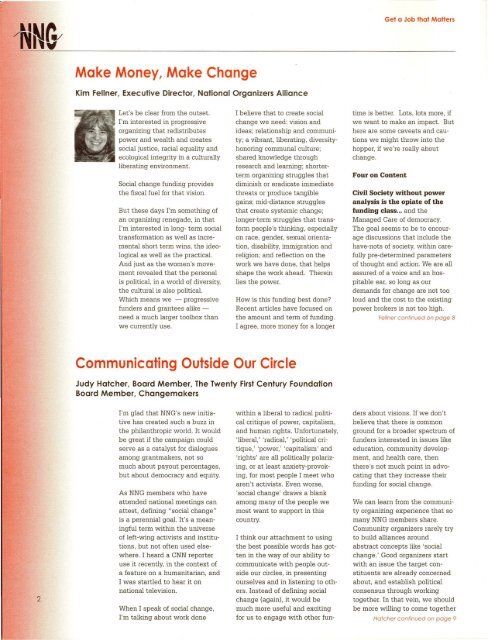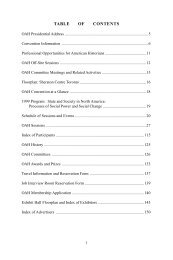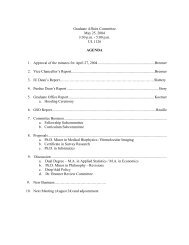What is Social Change Funding? Dana A. Alston: Activist and Funder
What is Social Change Funding? Dana A. Alston: Activist and Funder
What is Social Change Funding? Dana A. Alston: Activist and Funder
You also want an ePaper? Increase the reach of your titles
YUMPU automatically turns print PDFs into web optimized ePapers that Google loves.
2<br />
Make Money, Make <strong>Change</strong><br />
Kim Fellner, Executive Director, National Organizers Alliance<br />
Let's be clear from the outset.<br />
I'm interested in progressive<br />
organizing that red<strong>is</strong>tributes<br />
power <strong>and</strong> wealth <strong>and</strong> creates<br />
social justice, racial equality <strong>and</strong><br />
ecological integrity in a culturally<br />
liberating environment.<br />
<strong>Social</strong> change funding provides<br />
the f<strong>is</strong>cal fuel for that v<strong>is</strong>ion.<br />
But these days I'm something of<br />
an organizing renegade, in that<br />
I'm interested in long- term social<br />
transformation as well as incremental<br />
short term wins, the ideological<br />
as well as the practical.<br />
And just as the women's movement<br />
revealed that the personal<br />
<strong>is</strong> political, in a world of diversity,<br />
the cultural <strong>is</strong> also political.<br />
Which means we - progressive<br />
funders <strong>and</strong> grantees alike <br />
need a much larger toolbox than<br />
we currently use.<br />
I believe that to create social<br />
change we need: v<strong>is</strong>ion <strong>and</strong><br />
ideas; relationship <strong>and</strong> community;<br />
a vibrant, liberating, diversityhonoring<br />
communal culture;<br />
shared knowledge through<br />
research <strong>and</strong> learning; shorterterm<br />
organizing struggles that<br />
dimin<strong>is</strong>h or eradicate immediate<br />
threats or produce tangible<br />
gains; mid-d<strong>is</strong>tance struggles<br />
that create systemic change;<br />
longer-term struggles that transform<br />
people's thinking, especially<br />
on race, gender, sexual orientation,<br />
d<strong>is</strong>ability, immigration <strong>and</strong><br />
religion; <strong>and</strong> reflection on the<br />
work we have done, that helps<br />
shape the work ahead. Therein<br />
lies the power.<br />
How <strong>is</strong> th<strong>is</strong> funding best done?<br />
Recent articles have focused on<br />
the amount <strong>and</strong> term of funding.<br />
I agree, more money for a longer<br />
Communicating Outside Our Circle<br />
Judy Hatcher, Board Member, The Twenty First Century Foundation<br />
Board Member, <strong>Change</strong>makers<br />
I'm glad that NNG's new initiative<br />
has created such a buzz in<br />
the philanthropic world. It would<br />
be great if the campaign could<br />
serve as a catalyst for dialogues<br />
among grantmakers, not so<br />
much about payout percentages,<br />
but about democracy <strong>and</strong> equity.<br />
As NNG members who have<br />
attended national meetings can<br />
attest, defining "social change"<br />
<strong>is</strong> a perennial goal. It's a meaningful<br />
term within the universe<br />
of left-wing activ<strong>is</strong>ts <strong>and</strong> institutions,<br />
but not often used elsewhere.<br />
I heard a CNN reporter<br />
use it recently, in the context of<br />
a feature on a humanitarian, <strong>and</strong><br />
I was startled to hear it on<br />
national telev<strong>is</strong>ion.<br />
When I speak of social change,<br />
I'm talking about work done<br />
within a liberal to radical political<br />
critique of power, capital<strong>is</strong>m,<br />
<strong>and</strong> human rights. Unfortunately,<br />
'liberal,' 'radical,' 'political critique,'<br />
'power,' 'capital<strong>is</strong>m' <strong>and</strong><br />
'rights' are all politically polarizing,<br />
or at least anxiety-provoking,<br />
for most people I meet who<br />
aren't activ<strong>is</strong>ts. Even worse,<br />
'social change' draws a blank<br />
among many of the people we<br />
most want to support in th<strong>is</strong><br />
country.<br />
I think our attachment to using<br />
the best possible words has gotten<br />
in the way of our ability to<br />
communicate with people outside<br />
our circles, in presenting<br />
ourselves <strong>and</strong> in l<strong>is</strong>tening to others.<br />
Instead of defining social<br />
change (again), it would be<br />
much more useful <strong>and</strong> exciting<br />
for us to engage with other fun-<br />
Get a Job that Matters<br />
time <strong>is</strong> better. Lots, lots more, if<br />
we want to make an impact. But<br />
here are some caveats <strong>and</strong> cautions<br />
we might throw into the<br />
hopper, if we're really about<br />
change.<br />
Four on Content<br />
Civil Society without power<br />
analys<strong>is</strong> <strong>is</strong> the opiate of the<br />
funding class... <strong>and</strong> the<br />
Managed Care of democracy.<br />
The goal seems to be to encourage<br />
d<strong>is</strong>cussions that include the<br />
have-nots of society, within carefully<br />
pre-determined parameters<br />
of thought <strong>and</strong> action. We are all<br />
assured of a voice <strong>and</strong> an hospitable<br />
ear, so long as our<br />
dem<strong>and</strong>s for change are not too<br />
loud <strong>and</strong> the cost to the ex<strong>is</strong>ting<br />
power brokers <strong>is</strong> not too high.<br />
Fellner continued on page 8<br />
ders about v<strong>is</strong>ions. If we don't<br />
believe that there <strong>is</strong> common<br />
ground for a broader spectrum of<br />
funders interested in <strong>is</strong>sues like<br />
education, community development,<br />
<strong>and</strong> health care, then<br />
there's not much point in advocating<br />
that they increase their<br />
funding for social change.<br />
We can learn from the community<br />
organizing experience that so<br />
many NNG members share.<br />
Community organizers rarely try<br />
to build alliances around<br />
abstract concepts like 'social<br />
change.' Good organizers start<br />
with an <strong>is</strong>sue the target constituents<br />
are already concerned<br />
about, <strong>and</strong> establ<strong>is</strong>h political<br />
consensus through working<br />
together. In that vein, we should<br />
be more willing to come together<br />
Hatcher continued on page 9
















